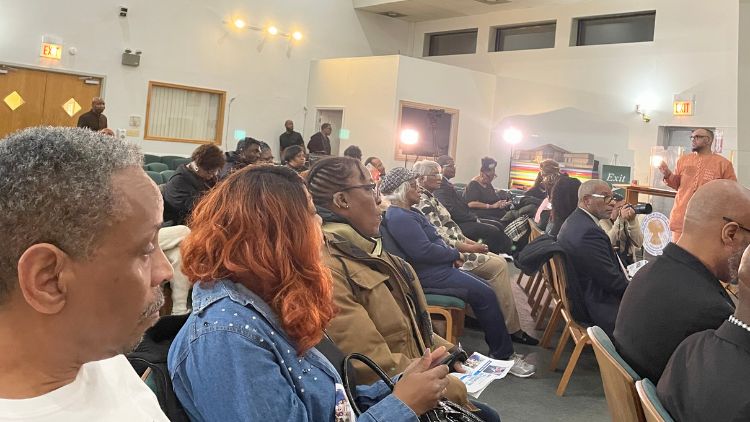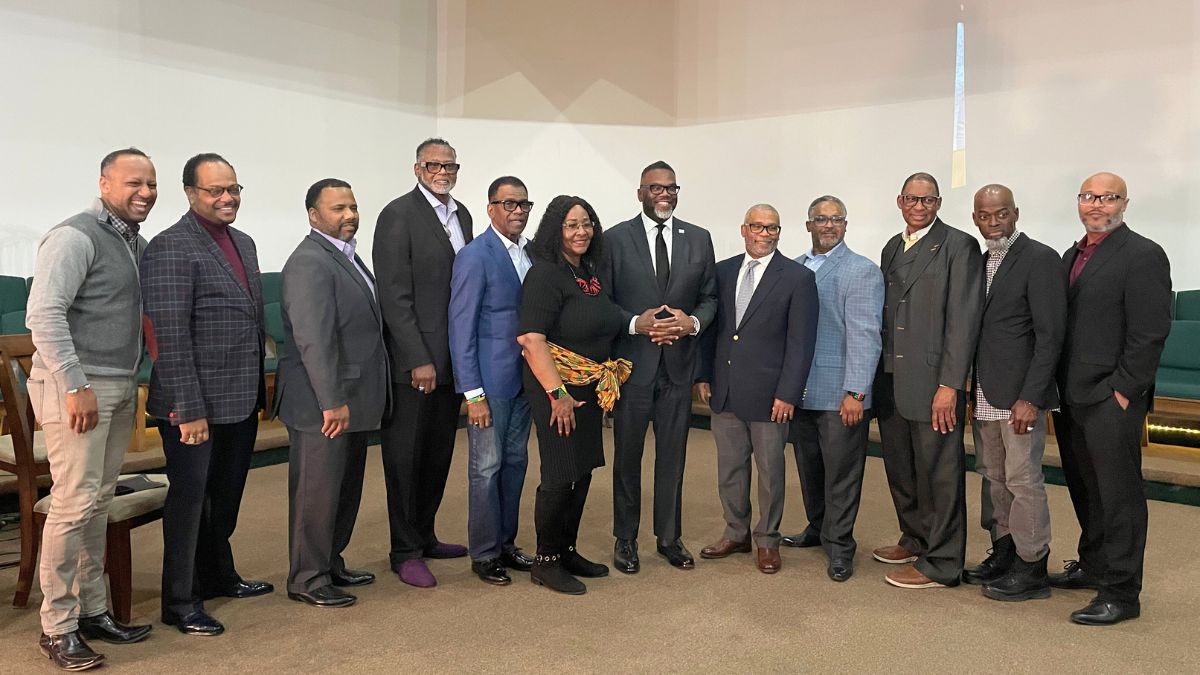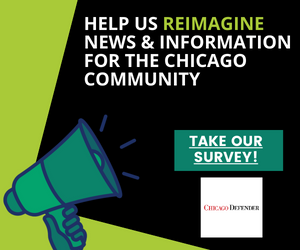Mayor Brandon Johnson’s Faith in Government Tour highlights his administration’s efforts on public safety, infrastructure investments, and community engagement (Photo Credit: Marshelle Sanders).
Mayor Johnson recently said he is committed to transparency and listening to the community as he navigates through the tough decisions inherited from his predecessors.
With a background in education, having started his career at Jenner Academy in Cabrini-Green and later teaching at Westinghouse College Prep and CTU organizer with his experience, he worked alongside educators, parents and community leaders to improve Chicago’s schools.
The mayor’s “Faith in Government Tour” initiative fosters direct engagement with residents. Through this tour, Mayor Johnson aims to discuss his administration’s priorities, initiatives, and progress while continuing to build trust with the community.
In other words, it was all about listening to the community.
The tour featured a group conversation with Bishop Dwight Gunn and Pastor Michael Eaddy from the Westside Community Development Collaboration at the People’s Church of the Harvest.
Mayor Johnson shared the importance of community support and the role of faith leaders in shaping government discussions. The West Side Community Development Collaboration, a coalition of 12 pastors and community leaders from Chicago’s West Side, supports his mission.
Mayor Johnson addressed questions from the discussion and audience on infrastructure, safety, migrants, mental health and more.
He acknowledged past government failures and stated, “Over decades, government has let our people down.” He cited the closure of schools and the destruction of public housing as missteps that have harmed communities.
Mayor Johnson touted what his administration had accomplished in the 21 and a half months in office.
“It got loud when the conversation turned to who we would invest in. It only got loud when I said, ‘How about this? Workers in this city are overworked, underpaid, and can’t even take time off to spend with their families. Workers begged for a day off, so I gave them 10 days. The largest city in America to provide paid time off for workers,’” said Johnson.
“Then it got loud when we said, ‘Let’s abolish the subminimum wage for restaurant workers—overwhelmingly women, Black, and Brown.’ I said, ‘Let’s eliminate it because it has ties to slavery. Let’s ensure that everything, including tips, counts toward their pay.’
He also emphasized his administration’s investment in people and ushering in the Blackest city administration in the city’s history.
“It got loud when we said, ‘Let’s balance the budget by investing in people.’ And it got loud because you have a Black mayor, a Black vice mayor, the first-ever Black woman chair of finance, a Black man as budget chair, a Black woman leading the Rules Committee, and Black women in key positions like Deputy Mayors for economic development, infrastructure, and community safety. Now, all of a sudden, people think they can manage our budget better than us.”
Safety and the Chicago Police Department

Audience members assembled at the People’s Church of the Harvest to listen to Mayor Johnson (Photo Credit: Marshelle Sanders).
Bishop Gunn asked about the mayor’s administration’s efforts to improve safety in Chicago, and Johnson said crime decreased significantly, citing a “swift decline in violence.”
He highlighted the nearly 28,000 young people employed through his One Summer Chicago youth employment program, which directly impacted violence reduction. Mayor Johnson also mentioned increasing the police force’s investigative capacity by hiring 200 new detectives, a campaign promise that, he said, directly correlated to the decrease in violence.
But he said there’s still much work to be done.
Additionally, Johnson introduced a community safety plan addressing mental and behavioral health. “40% of 911 calls are related to mental health crises. We’ve expanded our Crisis Intervention Response program so trained mental health professionals can respond instead of police officers.” While acknowledging progress, Johnson expressed confidence, stating, “If we continue on this path, we’ll continue to see a decline in violent crime in Chicago.”
Mayor Johnson also addressed questions about police coverage, overtime costs and prioritizing officer mental health.
“We’re working to improve our planning around police coverage and the activities that happen in Chicago,” he said. “We need more protection for significant events, and we’re asking event hosts to contribute more to community safety costs.”
Johnson added that having 1,000 officers with disability status has led to more police overtime costs.
Ultimately, he said it was about relieving officers of additional responsibilities so they could focus on community policing.
“Many officers need mental health support themselves, and now, with the care program, they’re better trained for the situations they face,” he explained.
He acknowledged concerns over police brutality settlements but expressed hope that constitutional policing would build community trust and reduce such incidents.
He also addressed the migrant crisis, investing in Black and brown communities, providing mental health services and infrastructure investments.
On the city’s migrant crisis during his first year in office:
“When I was sworn in, thousands of asylum seekers were already here, many sleeping on the floors of police districts. I had a choice: political or moral. I chose moral,” he stated.
On the need for mental health facilities and support, particularly in Black communities:
“The trauma here is comparable to what soldiers experience in war zones,” while also sharing his personal story of his brother’s struggles with untreated trauma. He highlights the Roseland Mental Health Clinic reopening in January and expanded services at Lakeland Library and the Pilsen Clinic.
On mental health support for first responders:
Mayor Johnson acknowledged the need for more providers and highlighted ongoing discussions: “We’re exploring ways to provide more support, though union negotiations make it challenging to mandate regular treatment,” he said.
On the city’s financial struggles:
Citing revenue growth isn’t keeping pace with rising expenses, Johnson said, “I don’t want to raise property taxes, but we can’t ask for more services without talking about revenue.”
Johnson called for progressive tax measures, such as closing corporate loopholes and implementing a real estate transfer tax, urging collective action to secure equitable funding: “The ultra-wealthy and corporations aren’t paying their fair share,” he said.
Johnson on the city council’s recent approval of an $830 million bond issue for infrastructure improvements, despite qualms about cost and repayment:
“The tax revenue from these jobs will cover the cost of the bond,” he explained, noting the decision to delay payment for two years to avoid overlapping bond payments. “This is standard government practice—investing in the future, just like any previous administration.” He said the bond would help build long-term infrastructure that benefits future generations.



